Chemrevise
Hey so I'm not sure if you have any resources I can use to study chemistry? Thanks in advance!
Chemrevise
It’s actually my chemistry teacher’s website, and pretty much everyone in my school lives off the notes he posts. The notes are concise but include everything and are especially good if you’re in the UK system/doing A Levels because he tailors them to the different exam boards. Even if you’re not a UK student, it’s still a great resource because science is the same everywhere lol (and the tab that says ‘Textbook’ is more universal and not exam board specific).
More Posts from Swirlspill-study and Others

💓 day 4 of 100 days of productivity 💓
studying for my final exam of the semester (!!!) with my brand new mildliners! i can definitely say that it took me a long time to decide if i really needed them, but now that i have them, i personally couldn’t imagine studying without them. if you’re on the fence about purchasing them, like i was, i highly recommend them! hope you’re having a fantastic day xx




august 23, 2016 | 8:08 pm | 10/100
MIDTERMS ARE FINALLY OVER!!! 🤓 been studying for philosophy and biology the last two day! here is a mind map for philosophy and flashcards for biology 🌎☄💫 now i’m just hoping and praying i get good results back 😫


May 5 2018
Got a lot of work done in the morning today but then accidentally took a nap form 8pm to 10pm and now I’m scared I’m gonna be awake all night LOL
Tomorrow studybuddy and I are going to the botanical gardens again!! I am so happy!!! To celebrate I painted three of the five succulent plants my roommate and I have adopted. It felt really good to paint again for once :C
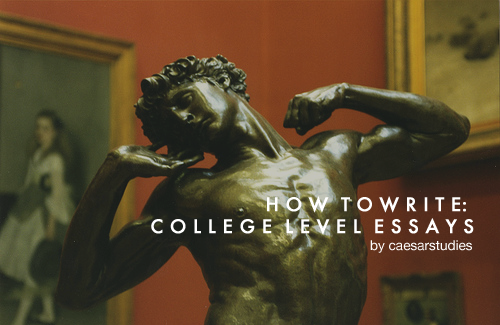
writing an essay in college is very different from writing an essay in high school. personally, i write more research/history papers than literary essays (the liberal arts life and curse), so this is going to be a post on how a general research-y essay that has a thesis and arguments.
intro
don’t open with a quote and don’t be overly broad.
avoid generalizations
your intro should address the topic of your essay (ex. the significance of gardens in renaissance society), and then narrow down to what you want to talk about in regards to your topic (ex. the political influence of the Medici gardens during the renaissance)
thesis! it should include the argument you want to make about the narrowed down topic, and three (or however many your class requires) reasons to support it. I like to think of it as W = X + Y + Z.
your thesis explains who, what and why in a concise manner.
body
topic sentences should not be a word for word copy of your thesis.
the order of arguments in your thesis is the order of your paragraphs
depending on the length of your essay, there should be at least two justifications to your argument.
so, just as the intro has a formula, X = A + B, and so forth.
A and B should be backed up with some sources/quotes. don’t forget that if you are quoting from class notes to put either the prof’s last name, or (class notes)
be sure to have clear and concise arguments, don’t be flowery
USE WORDS THAT ARE ACCURATE. thesaurus is great but if you use a word that sounds cool but doesn’t capture the meaning you want to convey then don’t use it, because it may just change the meaning of your argument
quote whatever isn’t yours. it is completely fine if 90% of your sentences are quotes. its weird to get used to, but don’t worry about it.
conclusion
the worst part in my opinion.
synthesize don’t summarize. show how your arguments relate back to the thesis.
try not to copy paste your thesis into the conclusion, word it so that the readers understands that through XYZ, you were able to conclude and support argument W (referring back to the thesis formula)
do not add any new information, do not add quotes.
your final sentence should tie up the essay in a pretty bow, but try to avoid clichés
protips
when writing the body paragraphs, your ‘weakest’ paragraph should be in the middle, strongest as your last, and the second best as your first.
if you’re stumped on the intro, skip it. write out the body first, then the intro and you’ll be able to concisely word your thesis
think of your essay as an infomercial. your intro is the loud and clear HERES MY PRODUCT, the body is blasting information on why the product is so cool, and the conclusion is the final push for the viewer to buy that product. make your teacher want to agree with your thesis!
use a mix of paraphrase and quotes!
don’t forget your works cited lmao (the MLA Handbook is a gr8 tool, also OWL Purdue)
prime time for essay writing is in the morning or at night, but make sure you edit it meticulously
EDIT ON PAPER NOT ON YOUR SCREEN
stay humble, study hard
Medical Student Resources 101
I’ve been thinking about this post for quite a while now, and I have finally decided how I want to approach it. If you have any suggestions, please comment or message me! So, when I started medical school 18 months ago all I had available to me was a crazy long list of textbooks recommended by the university. It has been an uphill battle figuring out what textbooks are helpful and which are less than helpful. So this is my masterpost of resources I’ve used for medical school thus far, organised by systems!
Basics
You’ll need a good anatomy atlas, physiology text and pathophysiology book as a bare minimum. Most universities also guide you towards a clinical skills book of some sort.
Anatomy:
Rohen and Yokochi “Color Atlas of Anatomy: A Photographic Study of the Human Body”
I used an old version of this book, and it was amazing for our human dissection block, I would strongly recommend it.
Physiology:
Boron “Medical Physiology”
Guyton and Hall “Textbook of Medical Physiology”
I used a combination of these two, Boron can be very heavy, so I only used it for topics I had a really good grasp of and wanted to know more about. I would recommend Guyton over Boron if you can only get one.
Pathophysiology:
Robbins and Cotran “Pathologic Basis of Disease”
This is one of the best books ever written. I cannot recommend it highly enough.
Clinical and Practical Skills:
Talley and O’Connor “Clinical Examination”
This was recommended by my university. It is a good textbook, however I’ve recently discovered:
Thomas and Monaghan “Oxford Handbook of Clinical Examination and Practical Skills”
and I personally prefer this, but it is much more concise, so Talley is great for all the background information.
Cardiovascular
Lilly “Pathophysiology of Heart Disease”
This textbook is fantastic, very easy to read and covered all of our cardiovascular block thoroughly.
Respiratory
West “Respiratory Physiology: The Essentials”
This book can be a bit hit and miss. I really didn’t like respiratory physiology, so I struggled a bit with this one, I used a combination of Guyton and Hall, and West. For pathophysiology you can’t go wrong with Robbins and Cotran.
Genitourinary
I didn’t use a specialised book for this block. For physiology I used Boron, which was insanely hard as a first year student. I also used Guyton and Hall at the end of the block, which was much better. So I’d definitely recommend Guyton and Hall for physiology and Robbins and Cotran for pathophysiology.
Gastrointestinal
Chew “Crash Course Gastrointestinal System 3e”
I really liked this book for this book, I thought it covered the hepatic system very well, overall it was very easy to read and understand. This book and Guyton and Hall if you wanted to supplement it would be great. As always, Robbins and Cotran for indepth pathophysiology.
Endocrine and Reproductive
Porterfield and White “Endocrine Physiology”
This was one of my favourite blocks! The university recommended Greenspan’s “Basic and Clinical Endocrinology”, which for what we needed was probably too much. I found a fantastic little orange book at the library, which I will need to go get the name of, so keep an eye on this if you need a good endocrinology book. UPDATE: little orange book found!
Psychiatry
Kaplan and Saddock’s “Synopsis of Psychiatry”
This is actually a really great book for any psychiatry you might do. We only used it for four weeks, but I’d definitely recommend hiring a copy if you can!
Neurology and Neuroanatomy
Yogarajah “Crash Course Neurology, 4e”
Fix “BRS Neuroanatomy”
Young “Basic Clinical Neuroscience”
This has been an incredibly hard block to find a good text for, at a reasonable price. These two have been very helpful, and I find them easy to read. Only time will tell if it has been enough to pass! Update: Young’s book is also excellent!
Musculoskeletal
Jenkins “Hollinshead’s Functional Anatomy of the Limbs and Back”
This is the most amazing textbook for any block of all time ever. Literally. It is so good! I’ve used a combination of this book, and:
Moore and Dalley’s “Clinically Oriented Anatomy”
for our musculoskeletal block. It’s been absolutely fantastic. I’ve enjoyed it so much! I would also recommend investing in some quality flashcards. I have:
Hansen “Netter’s Anatomy Flash Cards”
Which have been great, another really great resource has been WinkingSkull.com, which you do have to pay for, but it is helpful!
Other
So, there are a few other resources I’ve used that have been very helpful. Mostly online databases and websites but I thought it would be handy to have them. Many (most?) universities have subscriptions to them so try your university library website!
UpToDate: www.UpToDate.com
Everything you ever needed about anything in medicine
Best Practice: www.bestpractice.bmj.com
This is my favourite resource. Ever. It goes through signs, symptoms, risk factors, diagnostics, differentials, everything. It is a small slice of heaven in medical school.
Lancet Review Articles
There were a really great series on Immunology in The Lancet, I would strongly recommend trying to find them for a concise overview of immunology
Life In The Fast Lane: www.lifeinthefastlane.com
Great series on ECGs!
Radiopedia: www.radiopaedia.org
These guys are great for understanding what you’re actually supposed to be seeing on any radiological film. I’ve been using it a lot for musculoskeletal, looking at Le Fort fractures, etc.
Toronto Notes
So I just borrowed a friend’s copy of Toronto, but I believe there may be online access. Maybe an online version. It’s great for an overview and is a little more clinically focused. I really liked it for gastrointestinal, psychiatry and neurology.
Anatomy Zone
There’s a website and a YouTube channel with great tutorials and information for anatomy, particularly musculoskeletal. I’ve found it immensely helpful whilst studying for this block!
I know I’ve probably missed a few things, I’ll add them as I think of them but I hope this helps a few pre-clinical medical students out there! If it’s helpful I’ll keep you posted as I move into my clinical years on new texts and resources I find helpful!
I need advice. I've always had a problem with my grades. I've failed a lot of classes, not because I don't understand, just because I'm so depressed I can't find the motivation to do a single thing. I know that this year I NEED to get good grades. Report cards are almost out. Im more depressed now then ever. I have bad grades at the moment. I just recently learned that I have to put my cat down, and that is making it hard for me to even speak, let alone get stuff done. Any advice
/hugs/ I’m so sorry to hear that you’re going through a rough time. Especially with your cat.
First thing is first: take time. From what you’ve written, it doesn’t sound like the content of your classes is causing you trouble. Rather, it seems like there’s external factors that’s preventing you from studying - circumstances which are triggering your depression etc.
Studying with depression is difficult. Consider professional help as an option. Rely on your support network. Learn to forgive yourself for not performing at your best because of your mental illness. Remember - it is something to be managed; not a barrier to your success.
I’d also consider speaking with your faculty/ advisor etc. There may be formal avenues of review or adjustments to where/ when you take your exams and/or deadlines that may help relieve the stress in the interim as you get back on your feet.
Here’s some tips re: motivation
Five Practical Study Tips to Keep Motivated in School by @nag-aaral/ @sadgirlstudying (working link by @pas-au-talent)
Motivation by @areistotle
Motivation masterpost by @elkstudies
Motivation masterpost by @artkidstudies
Tips for avoiding burnout and staying motivated by @coffeesforstudiers
And for dealing with failure:
Dealing with Failure
Shit Grade? Feeling better after a terrible exam
This response
And this one
And this one here
On Bad Semesters by @post–grad
This Masterpost by @areistotle
How to Fail by @psychstudyblr
Good luck - give yourself time. Focus on “how” (not just a demand - ‘need’) to get exams. Celebrate your victories - not matter how small. Because it’s going to be a slow process. But you’ll get there. It may not be the ‘perfect’ solution or the perfect ‘result’ you want - but hell, we’re human. It keeps things interesting.
If you spend a lot of time on your laptop for work, study, etc., you should definitely check out this app called Noizio. It provides ambient background sounds that help calm you or keep you focused. You can even make and save your own combination of sounds. My personal favourite is winter wind + wind chimes + sea waves. Each sound’s volume can be adjusted individually as well!
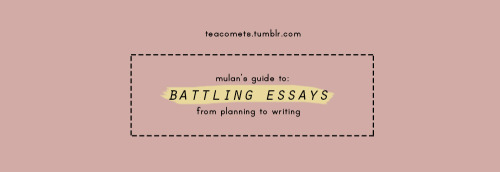
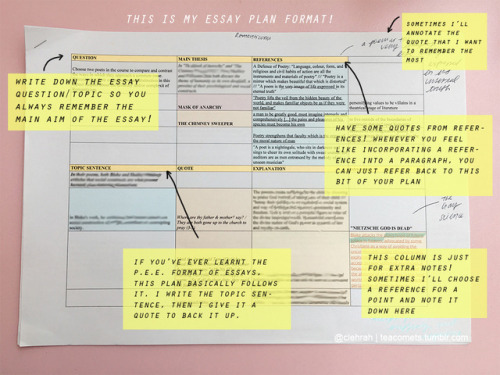
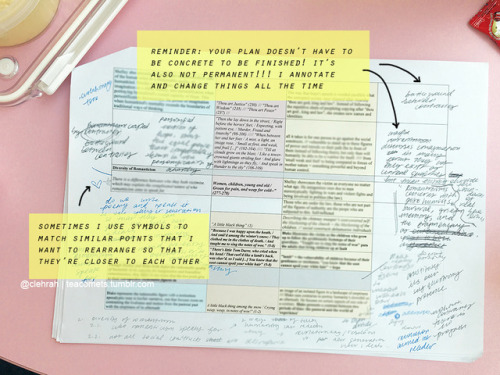
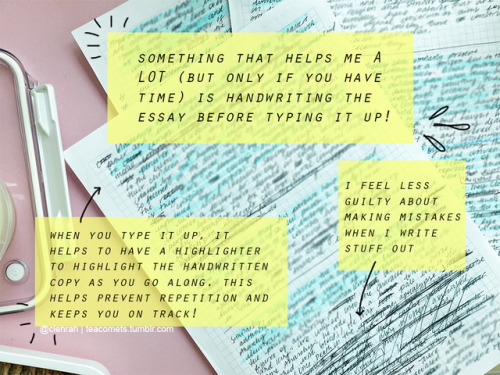
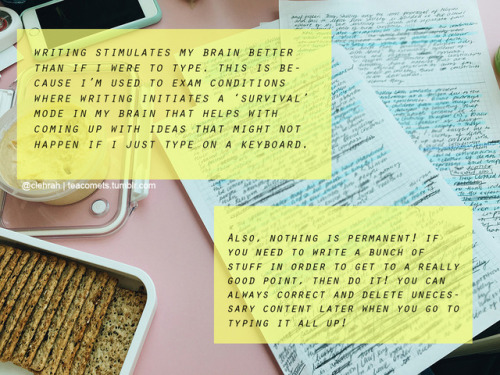

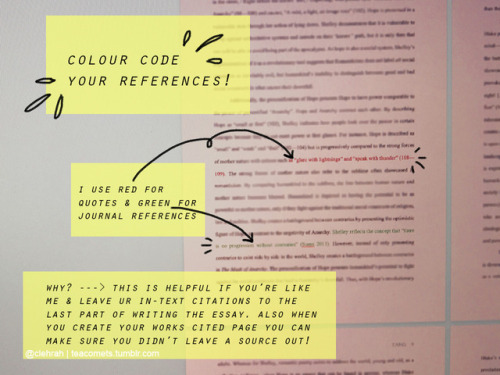
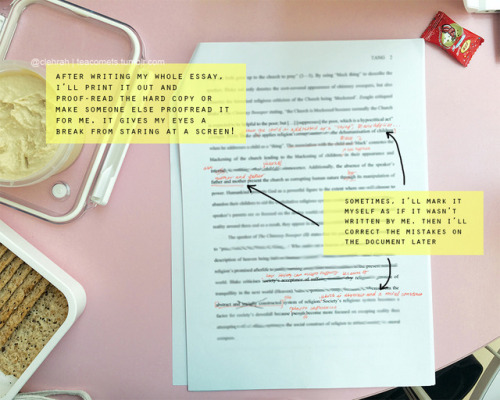

a small guide on how i battle my essays! (click on an image to view it clearer)
(keep in mind: i’m an english major so a majority of my essays are literature-focused!)
these are just some of the methods i want to share that work for me when i write my innumerable amount of essays! i’m definitely a huge planner so it’s no secret that i spend a lot of time on an essay. if you’re a deadline fighter, these tips might not necessarily be helpful (especially the handwriting one). but i hope this gives you an insight on how i write my essays! 🌈
-
 thisisalokisafeplace liked this · 4 years ago
thisisalokisafeplace liked this · 4 years ago -
 my-life-as-a-fangirl liked this · 4 years ago
my-life-as-a-fangirl liked this · 4 years ago -
 luckypatrolskeletonprune liked this · 4 years ago
luckypatrolskeletonprune liked this · 4 years ago -
 blaxkxx reblogged this · 4 years ago
blaxkxx reblogged this · 4 years ago -
 fakeassshoe liked this · 4 years ago
fakeassshoe liked this · 4 years ago -
 misfitstuff liked this · 4 years ago
misfitstuff liked this · 4 years ago -
 starhatcher reblogged this · 4 years ago
starhatcher reblogged this · 4 years ago -
 finnboi03 liked this · 5 years ago
finnboi03 liked this · 5 years ago -
 bintoustudies liked this · 5 years ago
bintoustudies liked this · 5 years ago -
 queenkasstuff liked this · 5 years ago
queenkasstuff liked this · 5 years ago -
 swirlspill-study reblogged this · 6 years ago
swirlspill-study reblogged this · 6 years ago -
 orphic-life liked this · 6 years ago
orphic-life liked this · 6 years ago -
 aonodoe liked this · 6 years ago
aonodoe liked this · 6 years ago -
 bbbaby13 liked this · 6 years ago
bbbaby13 liked this · 6 years ago -
 satansarae liked this · 6 years ago
satansarae liked this · 6 years ago -
 oseanplanet liked this · 6 years ago
oseanplanet liked this · 6 years ago -
 me-owo liked this · 6 years ago
me-owo liked this · 6 years ago -
 destiny14444 liked this · 6 years ago
destiny14444 liked this · 6 years ago -
 m-bt liked this · 6 years ago
m-bt liked this · 6 years ago -
 fungicos liked this · 6 years ago
fungicos liked this · 6 years ago -
 importanthingsforthefutureandnow reblogged this · 6 years ago
importanthingsforthefutureandnow reblogged this · 6 years ago -
 atoucan liked this · 6 years ago
atoucan liked this · 6 years ago -
 boulev4rdbrokendreams-blog liked this · 6 years ago
boulev4rdbrokendreams-blog liked this · 6 years ago -
 thekidstudying liked this · 7 years ago
thekidstudying liked this · 7 years ago -
 seriesofdumbmistakes liked this · 7 years ago
seriesofdumbmistakes liked this · 7 years ago -
 peace-out-bitch1789 liked this · 7 years ago
peace-out-bitch1789 liked this · 7 years ago -
 sljdmcclendon liked this · 7 years ago
sljdmcclendon liked this · 7 years ago -
 outlastdesire reblogged this · 7 years ago
outlastdesire reblogged this · 7 years ago -
 neurochemgirl reblogged this · 7 years ago
neurochemgirl reblogged this · 7 years ago -
 erasercrumb liked this · 7 years ago
erasercrumb liked this · 7 years ago -
 timotheechalamct liked this · 7 years ago
timotheechalamct liked this · 7 years ago -
 fairytaledaydream-123 liked this · 7 years ago
fairytaledaydream-123 liked this · 7 years ago -
 takemetoavalon liked this · 7 years ago
takemetoavalon liked this · 7 years ago
a study blog for collected references, advice, and inspiration
267 posts

